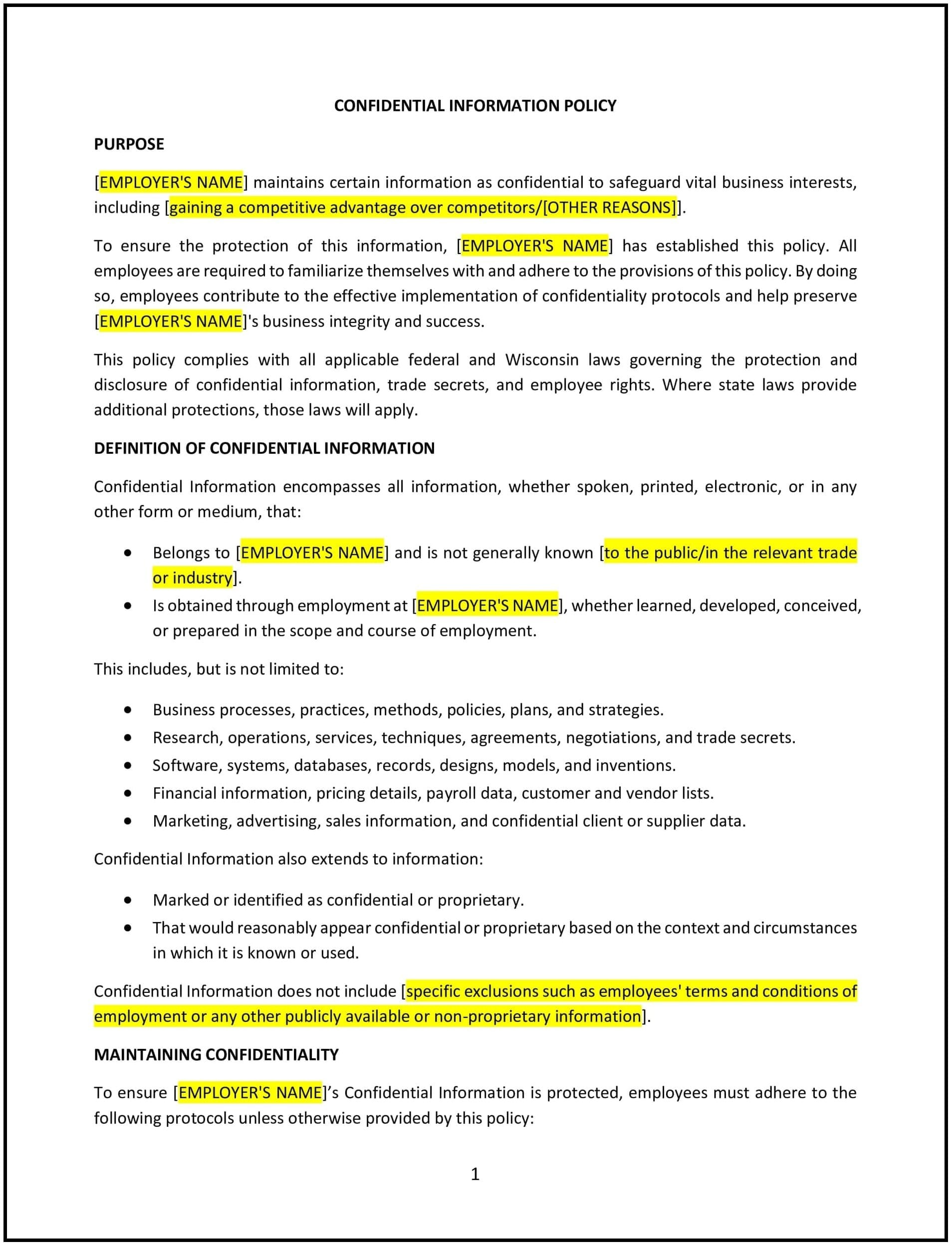Confidential information policy (Wisconsin): Free template
Got contracts to review? While you're here for policies, let Cobrief make contract review effortless—start your free review now.

Customize this template for free
Confidential information policy (Wisconsin)
A confidential information policy helps Wisconsin businesses protect sensitive and proprietary information from unauthorized disclosure, theft, or misuse. This policy defines what constitutes confidential information, the responsibilities of employees in safeguarding that information, and the consequences for failing to do so. It establishes clear guidelines on handling, storing, and sharing confidential information to ensure the company’s intellectual property and business operations are protected.
By implementing this policy, businesses can mitigate risks related to data breaches, comply with privacy laws, and maintain the trust of clients, customers, and stakeholders.
How to use this confidential information policy (Wisconsin)
- Define confidential information: Clearly specify what constitutes confidential information, including business strategies, customer lists, financial data, trade secrets, proprietary software, and any other sensitive company data.
- Establish confidentiality agreements: Require employees to sign confidentiality agreements as part of their employment or contractual agreements. These agreements should outline their responsibilities for protecting confidential information during and after their employment.
- Set guidelines for data access: Define who within the company has access to confidential information and under what circumstances. Specify any restrictions on accessing or sharing confidential data, both internally and externally.
- Implement data protection measures: Outline the security measures employees must follow to protect confidential information, such as using encrypted communications, secure passwords, and authorized access controls.
- Address sharing information: Specify the protocols for sharing confidential information, including how to securely share information with third parties, vendors, or contractors while ensuring they also adhere to confidentiality guidelines.
- Define storage and disposal: Specify how confidential information should be stored, both physically and digitally, and the procedures for disposing of confidential information once it is no longer needed, including shredding paper documents and securely deleting electronic files.
- Set clear reporting procedures: Define how employees should report any suspected breaches of confidentiality, including who to contact, the steps for investigation, and the company’s response to potential breaches.
- Establish penalties for violations: Outline the disciplinary actions that will be taken if employees violate the confidentiality policy, including warnings, termination, or legal action if the breach is severe.
Benefits of using this confidential information policy (Wisconsin)
This policy offers several benefits for Wisconsin businesses:
- Protects intellectual property: The policy helps safeguard the company’s intellectual property, trade secrets, and sensitive data, reducing the risk of leaks or theft.
- Reduces legal and financial risks: By promoting confidential information to be handled properly, the policy reduces the risk of costly legal action or regulatory penalties resulting from data breaches or unauthorized disclosure.
- Enhances trust with clients: Maintaining the confidentiality of customer data builds trust and strengthens relationships with clients, demonstrating the company’s commitment to data privacy and security.
- Supports regulatory compliance: The policy helps promote compliance with state and federal data protection regulations, including those governing consumer privacy and security, such as the General Data Protection Regulation (GDPR) or the California Consumer Privacy Act (CCPA), if applicable.
- Promotes a culture of security: The policy fosters a culture of security and accountability, encouraging employees to take responsibility for protecting sensitive information and adhering to best practices for data security.
Tips for using this confidential information policy (Wisconsin)
- Communicate the policy clearly: Ensure that all employees understand the importance of confidentiality and their responsibilities for safeguarding company data. Provide regular training on how to handle confidential information and the security measures to follow.
- Monitor compliance: Regularly review how employees are handling confidential information and take action to address any gaps in compliance or security practices.
- Use secure communication tools: Provide employees with secure communication tools, such as encrypted email and secure file-sharing platforms, to prevent unauthorized access to sensitive data.
- Limit access to sensitive data: Ensure that access to confidential information is restricted to employees who need it to perform their job duties. Use access control mechanisms to enforce these restrictions.
- Review periodically: Regularly review and update the policy to ensure it supports compliance with Wisconsin laws, federal regulations, and the company’s evolving data security needs.